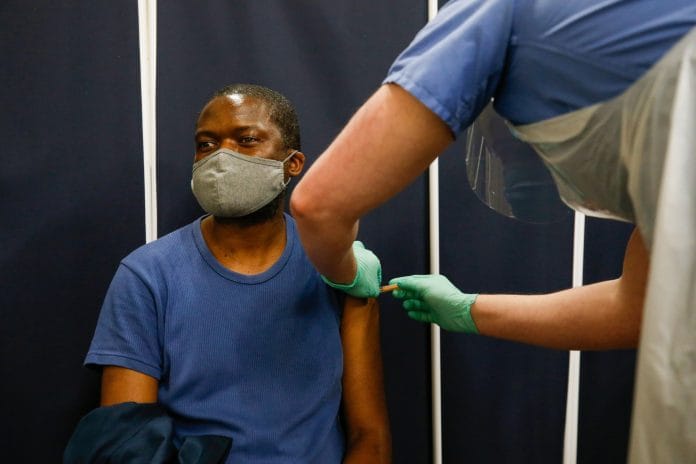London: U.K. ministers may bring forward second vaccine doses for millions of people after Prime Minister Boris Johnson said he’s “anxious” about the spread of a Covid-19 variant from India.
Cases of the new B.1.617.2 strain of Covid-19 have risen to 1,313 from 520 over the past week, Public Health England said Thursday, assessing the strain to be “at least as transmissible” as the so-called Kent variant that took hold in December, precipitating the U.K.’s third lockdown in January.
“We are anxious about it, it has been spreading,” Johnson said in a pooled broadcast interview. “There’s a range of things we could do, we’re ruling nothing out.”
Johnson’s comments raise the prospect the government may be forced to slow down its roadmap to open the economy from the country’s third coronavirus lockdown. That could put him into conflict with members of his own Conservative Party, who have already been agitating for a faster reopening amid a vaccination program that’s one of the most advanced in the world.
“Why on earth would we lock down when the vaccines continue to break the link between cases and hospitalizations and deaths?” Steve Baker, chairman of the party’s Covid Recovery Group, said in a statement. “We were told the roadmap was cautious — in spite of the overwhelmingly promising data on the benefits of the NHS vaccine rollout — precisely so it would be irreversible.”
Exiting lockdown
Authorities are carrying out surge testing in places such as Bolton, in northwest England, where cases have been detected, as well as in parts of London, PHE said. Late on Thursday, the Department for Health and Social Care said in a statement that ministers are considering bringing forward planned second vaccine doses for eligible groups.
At present, the U.K. allows for up to 12 weeks between first and second doses. Almost 36 million people have had their first dose, of whom almost 19 million have had a second dose, according to official statistics. That leaves 17 million people whose second doses could be brought forward if the government decides to change policy.
“While there is no firm evidence yet to show this variant has any greater impact on severity of disease or evades the vaccine, the speed of growth is concerning,” the department said. Health Secretary Matt Hancock said the government “will not hesitate to take further action if necessary.”
Wales unlocks
The third stage of the government’s 4-step plan to unlock the economy in England is due Monday, when people will be allowed to meet indoors in homes, pubs and restaurants once more. Cinemas and theaters will be allowed to reopen, and international holidays will no longer be illegal.
Wales will also ease restrictions Monday, moving to alert level 2 from level 3, First Minister Mark Drakeford is set to confirm Friday, according to a statement from his office. Indoor hospitality businesses and entertainment venues will be able to open and more people will be allowed to attend organized indoor and outdoor activities. But Drakeford, too, warned of the new dangers.
“The pandemic isn’t over: the new, so-called Indian variant of concern is another unwanted twist in this pandemic, which we are monitoring closely,” he said.
For England, a final phase of reopening is planned for June 21 at the earliest, when the government hopes to be able to lift most remaining restrictions. For now, Johnson said he’s not concerned about the timetable slipping.
“We’ve already been very clear that we will be led by the data,” he said. “At the moment I can see nothing that dissuades me from thinking we will be able to go ahead on Monday and indeed on June 21, everywhere.” — Bloomberg
Also read: UK & Indian Covid strains two most widely circulated mutant variants in India, scientists find






